First prototype of the Gauntlet championship belt. Forgive the staples. also need better fonts. any suggestions?
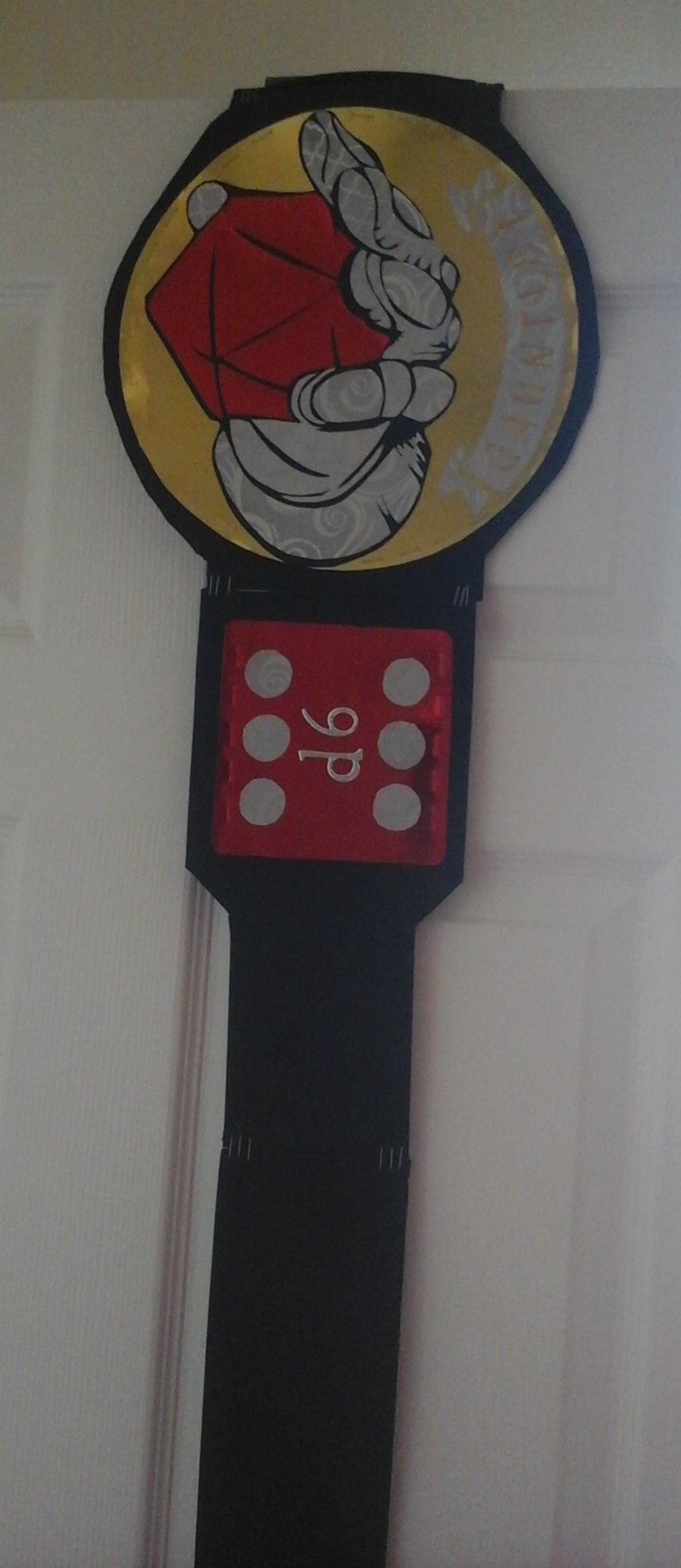
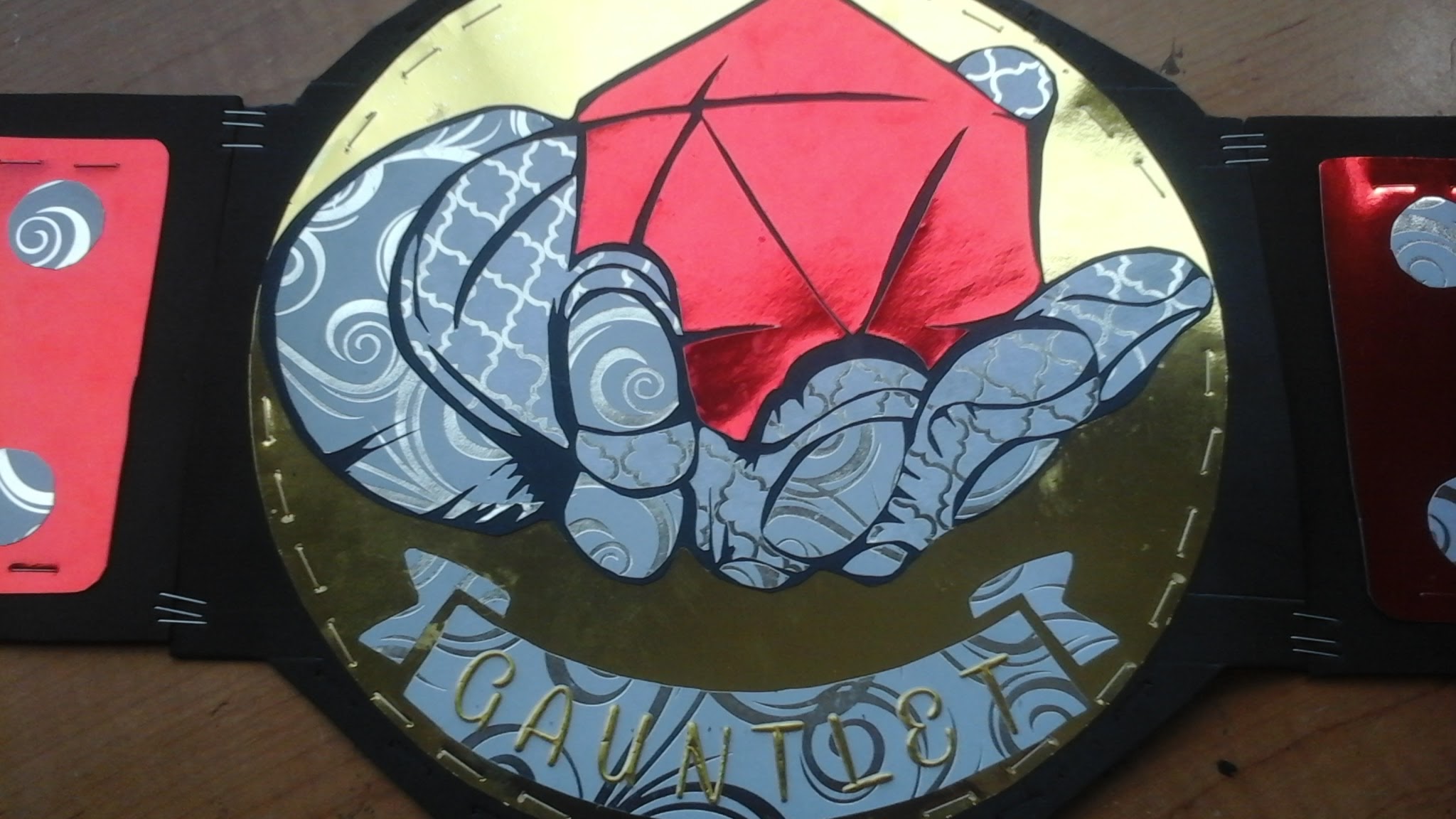
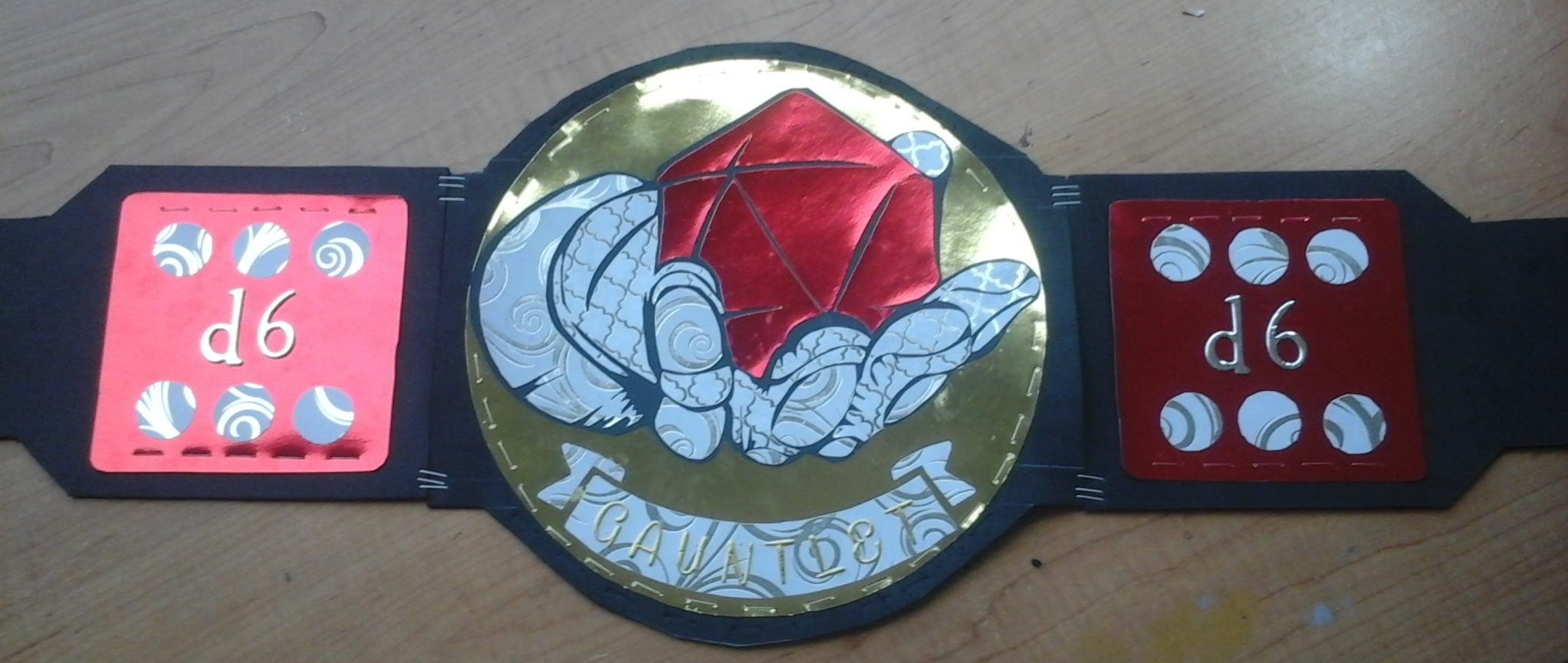
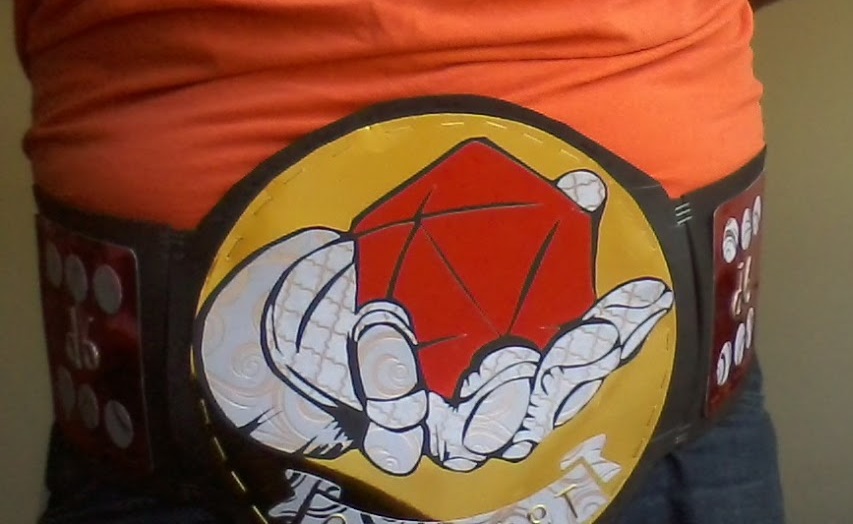
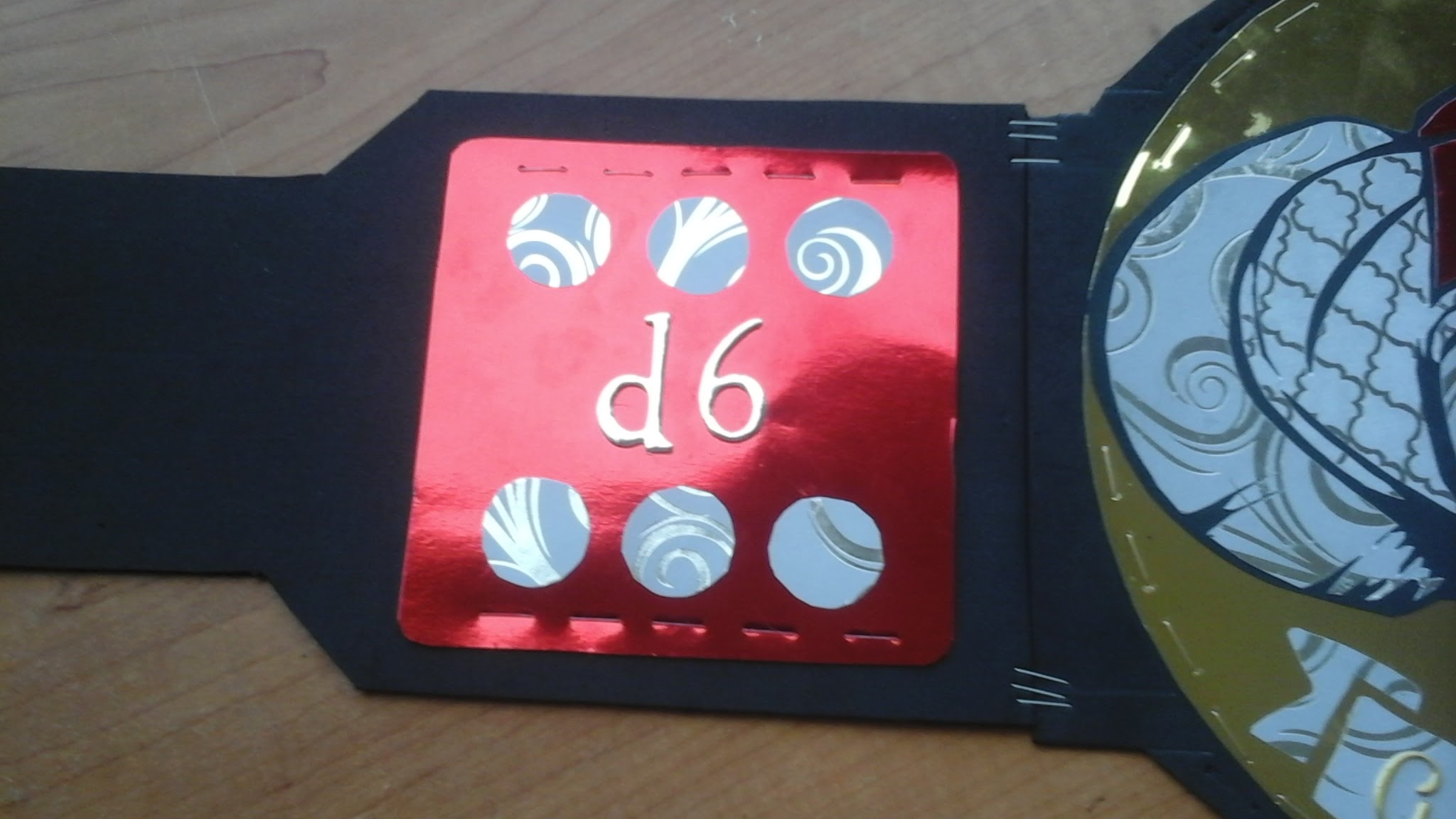
Google+ community from Dec 2012 to March 2019
First prototype of the Gauntlet championship belt. Forgive the staples. also need better fonts. any suggestions?
First prototype of the Gauntlet championship belt. Forgive the staples. also need better fonts. any suggestions?





On Friday, we played the #Threeforged games The Clinic and Timelines.
On Friday, we played the #Threeforged games The Clinic and Timelines. I’m going to make my thoughts fairly brief, but will invite the other players (Steve Mains Daniel Lewis Daniel Fowler and Scott Owen) to offer their thoughts in the comments.
The Clinic
I was very interested in the concept of this game, which involves a group of test subjects being held in a mysterious clinic run by an alien staff. The game has a fun character creation process in which you write pairs of descriptors and memory fragments, and then combine two of those descriptor/memory pairs to make a PC. The setup also has a list of questions that must be answered about the Clinic and the Staff. I love procedures like that, because they tend to get you in the right headspace for the game, and force you to think critically about the setting before you begin play.
Unfortunately, the game is unplayable in its current state. By my estimation, it would have taken us approximately fifteen hours to finish a single game (and I believe it was intended as a one-shot). The setting could have been handled very effectively with a clean, simple scene-framing and resolution system like you might find in Archipelago. Instead, it has layers and layers of mechanical complexity. For example, there are fourteen different scene types, each of which is handled a little differently, mechanically-speaking. There is a competitive card game layered on top of that, the outcome of which dictates not only conflict resolution, but also your character’s ultimate fate in the game. None of this is helped by the fact the rules are not organized in a way that makes it easy to understand what is going on. I’m certain if we were more experienced with the game, we would have been able to handle it all a little more smoothly, but I’m not sure the payoff would be worth investing that kind of time.
I hope the designers go back and playtest and revise, though, because there is definitely a lot to like here in terms of setting. Ultimately, it just needs to be cleaner and simpler, and it would be a winner.
Timelines
We had much better luck with this game, in which the whole group plays out the life (lives?) of a time traveler named Jamie Titor. The setup, which involves playing out several events in Jamie’s life he has regrets about, is really damn cool. The gameplay proper involves each player taking on the role of a different Jamie (Jamie-A, Jamie-B, Jamie-C, and so forth) who has discovered time travel, and is now going back in time to repair the events in his past that are causing him regret. Of course, as you might expect, there are consequences to doing that, and a series of ripples might cause new developments down the timeline, for better or worse.
The fundamentally cool thing about this game is that each new Jamie has a different set of regrets, because they experienced things in a manner different than Jamie Prime (called Jamie-XX), based on how the timeline has been altered. As a result, each new Jamie is going back in time, fiddling with things, making them worse or better, and invoking the ire of other Jamies, who may themselves go back in time to stop a prior Jamie. It’s a wonderful mindfuck, and I really loved it . . . in theory.
While it’s pretty clear the rules technically work, in play, the game has a very practical problem: the amount of bookkeeping that has to be done is bonkers. The game routinely stops, sometimes for 10 minutes or more, as the last player writes down all the changes and adjustments that have to be made before the next player can have their turn. It was a real heartbreaker, because it’s obvious when you sit down to play that what is taking place is really damn cool.
I don’t know who the authors of this game are, but I would happily offer my assistance to get this game into a form that is practical to play. I’m very fond of it.
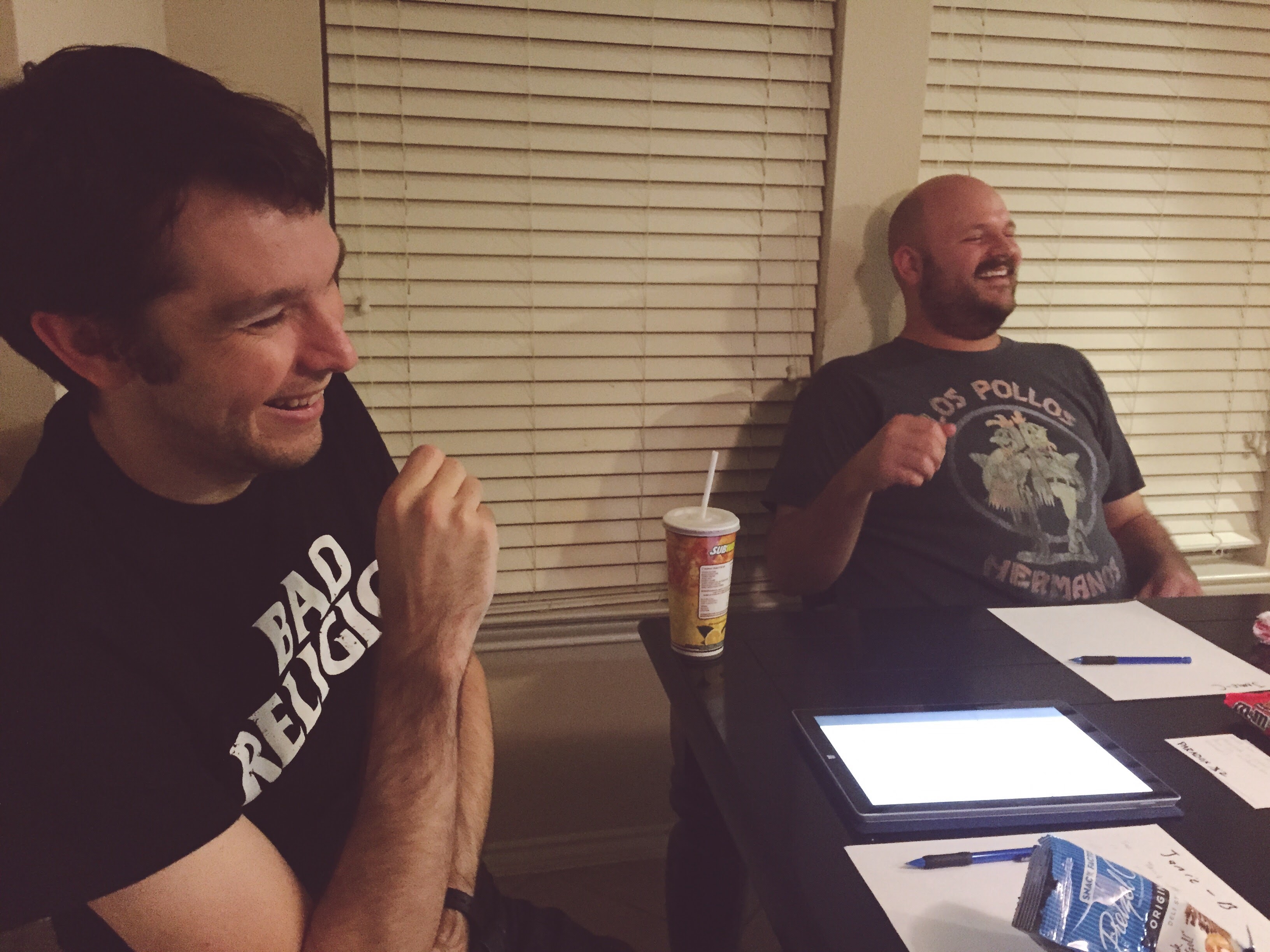
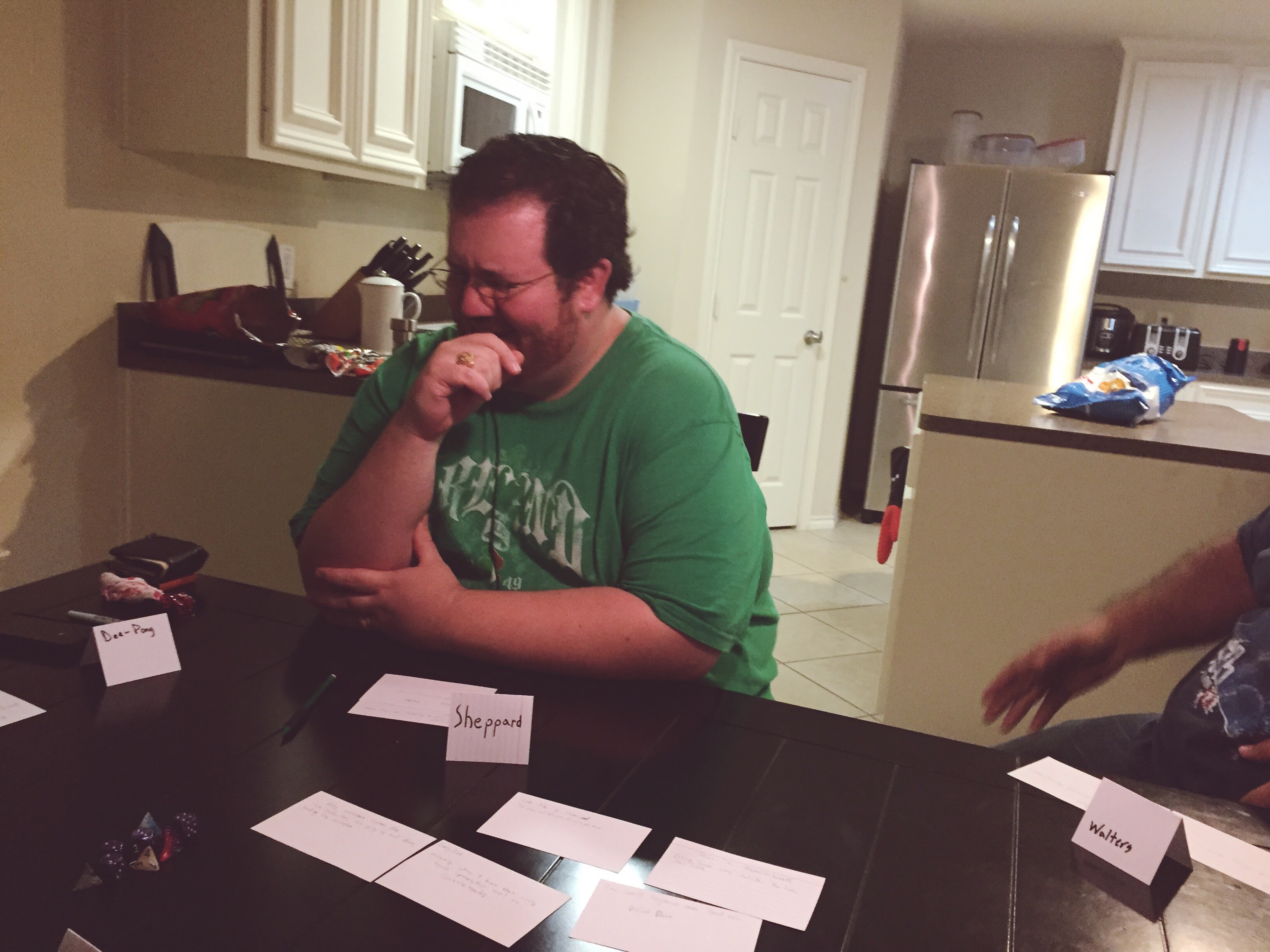
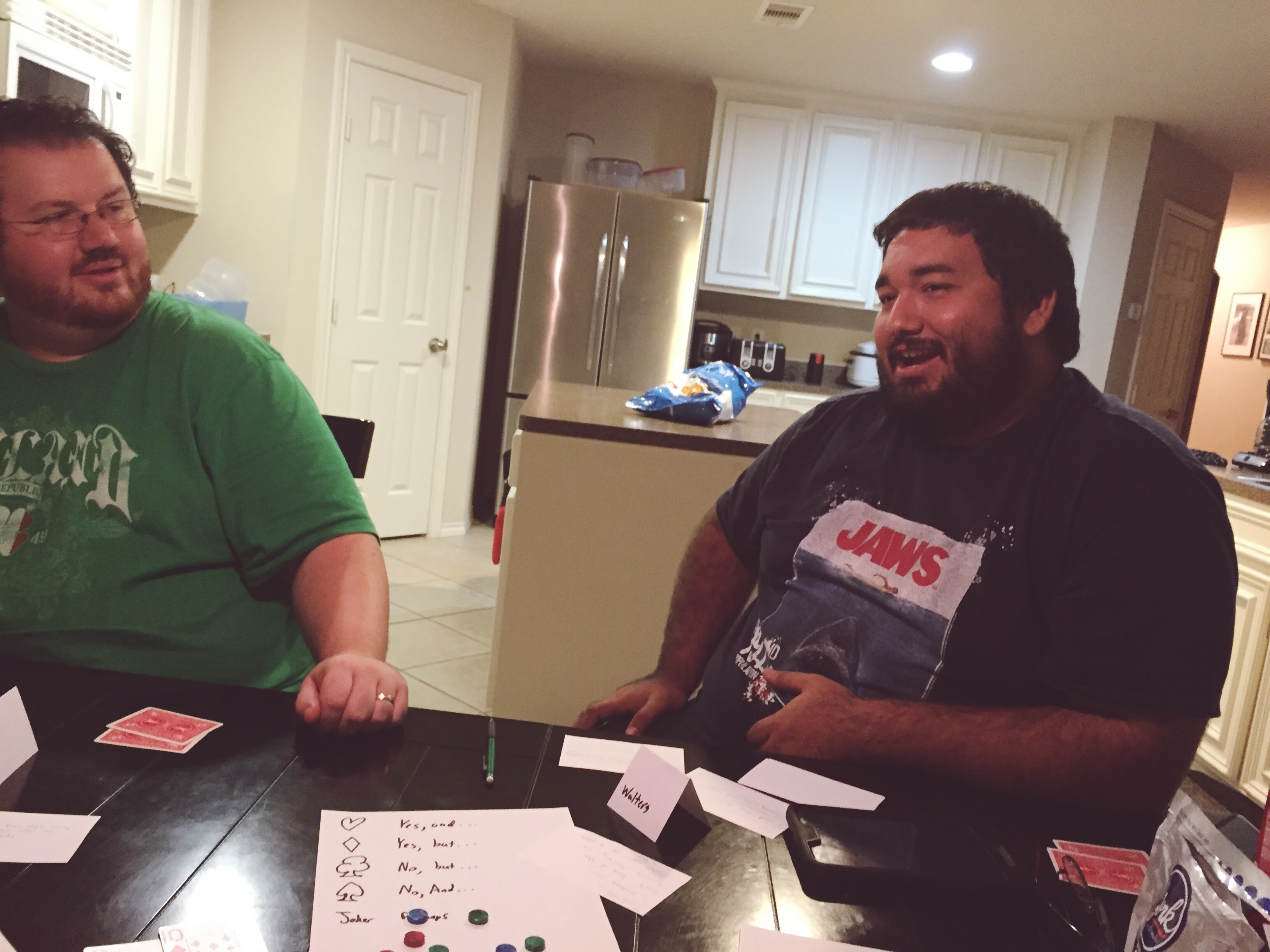
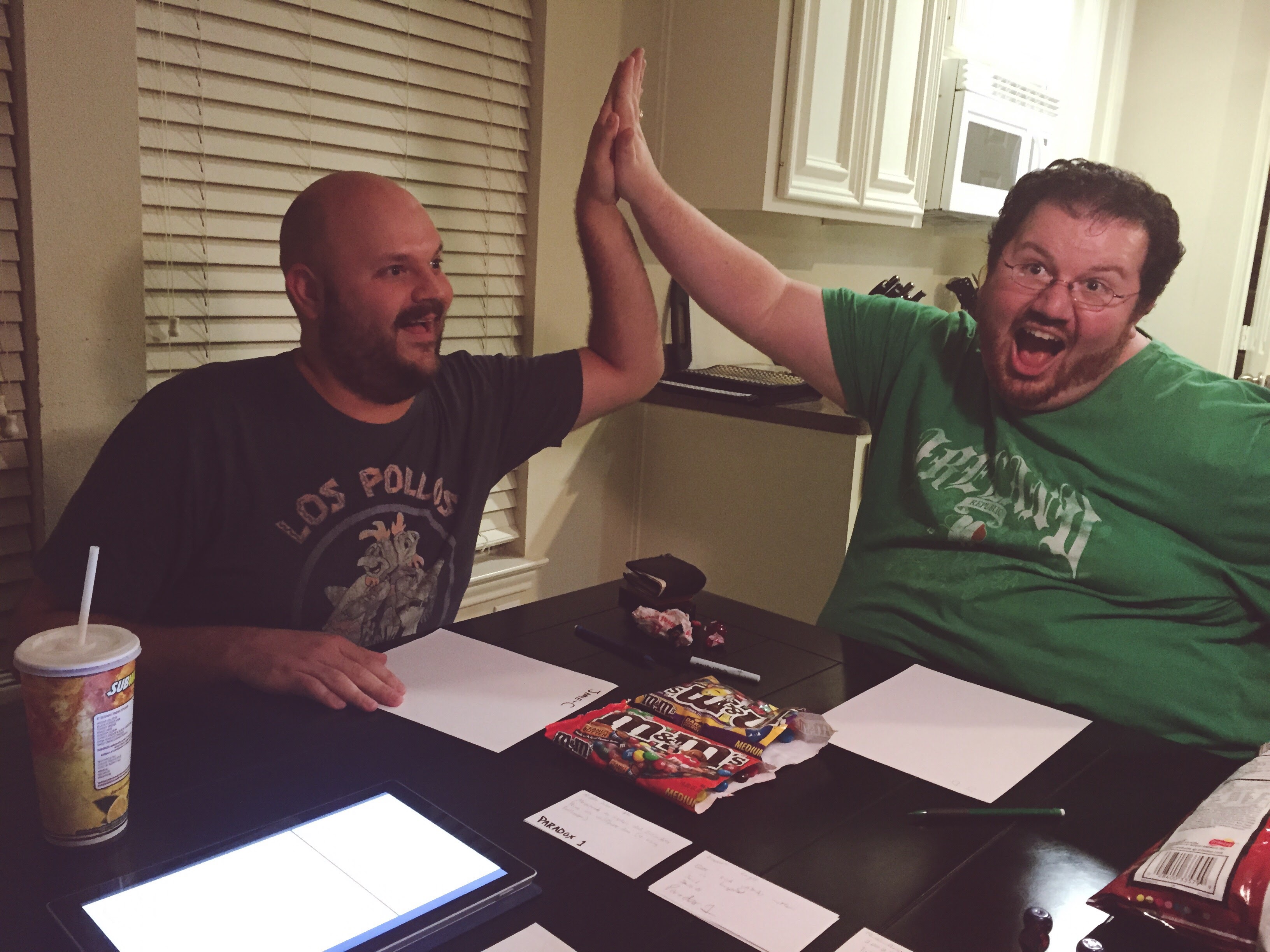
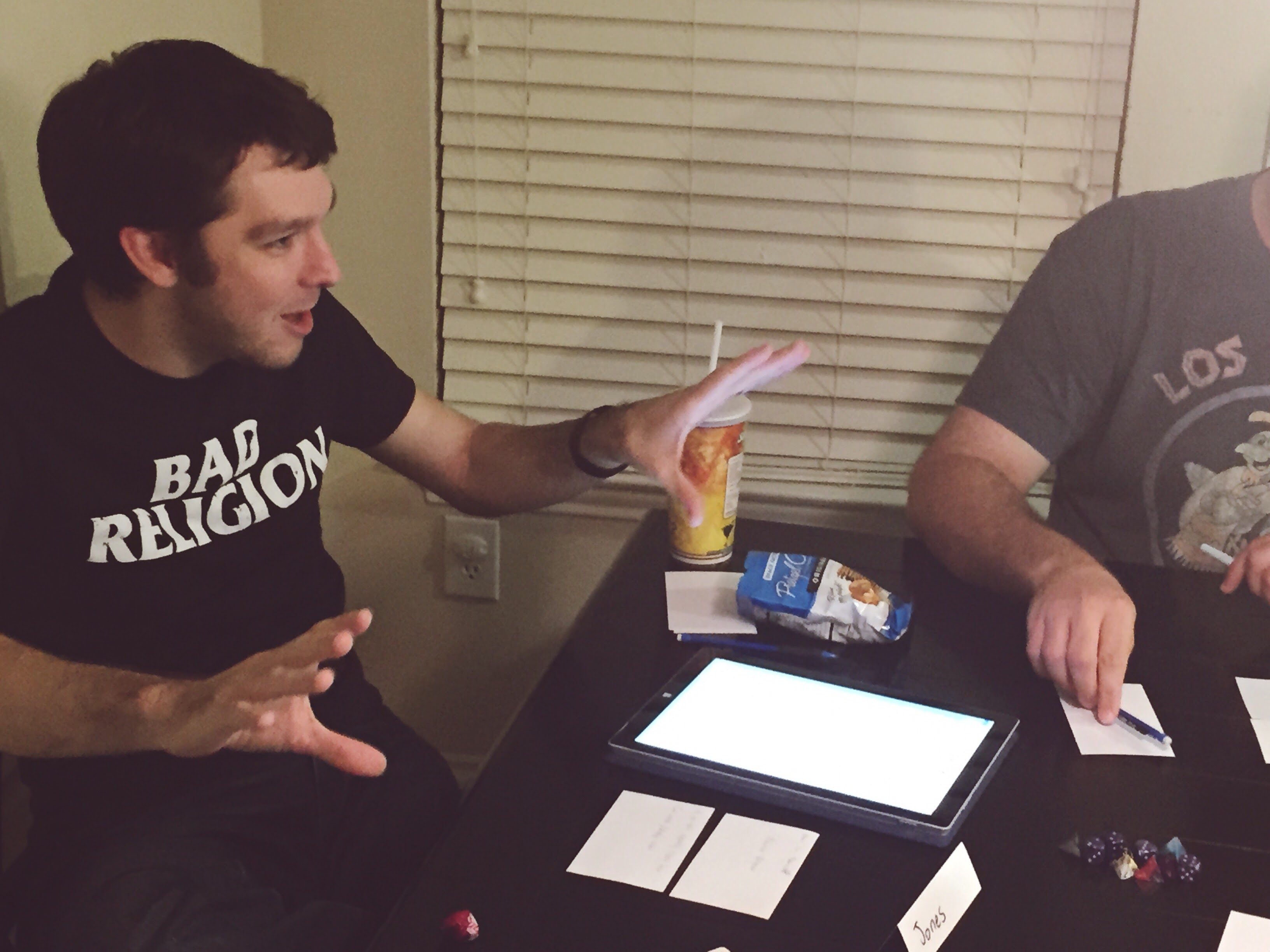
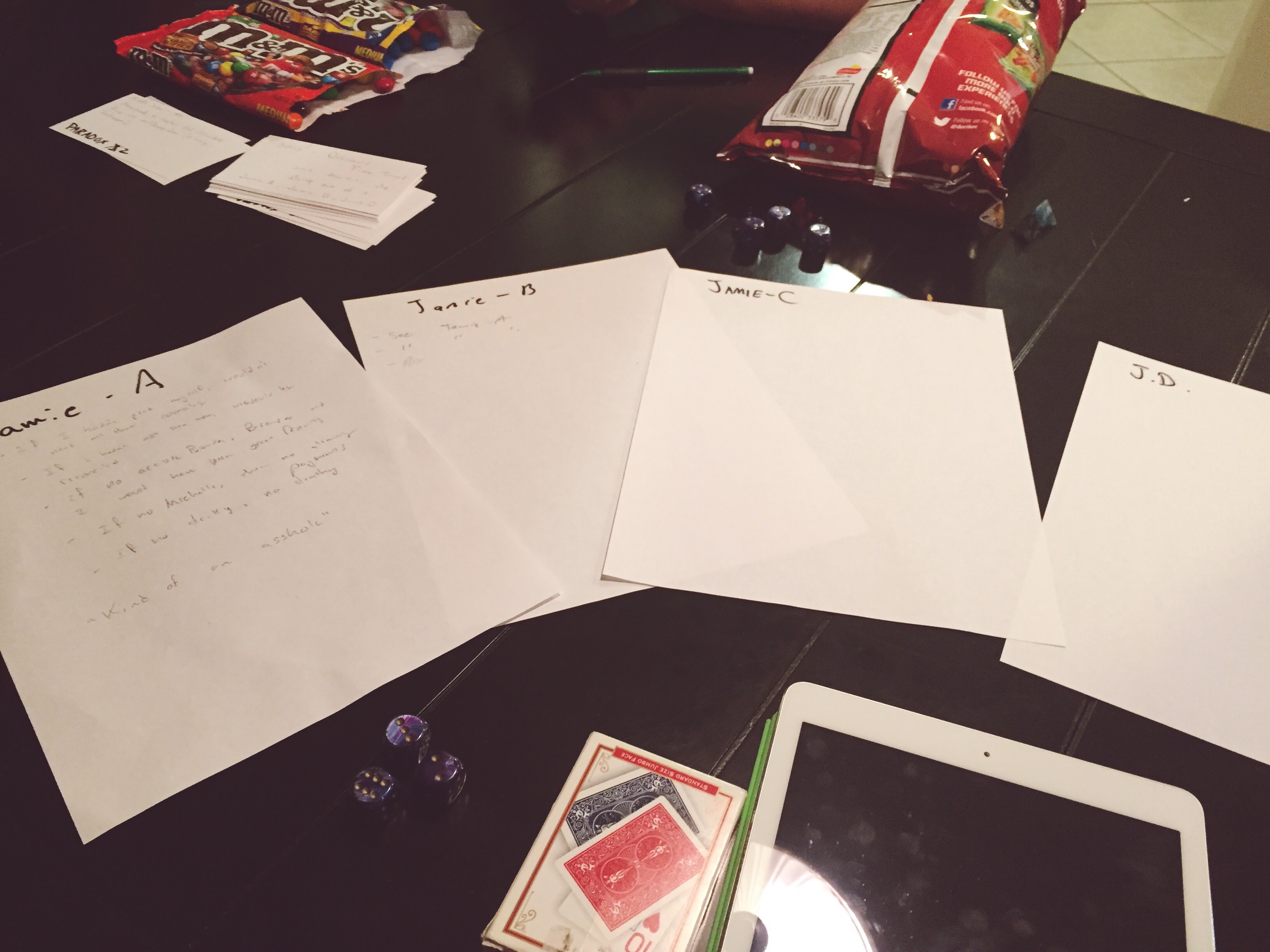
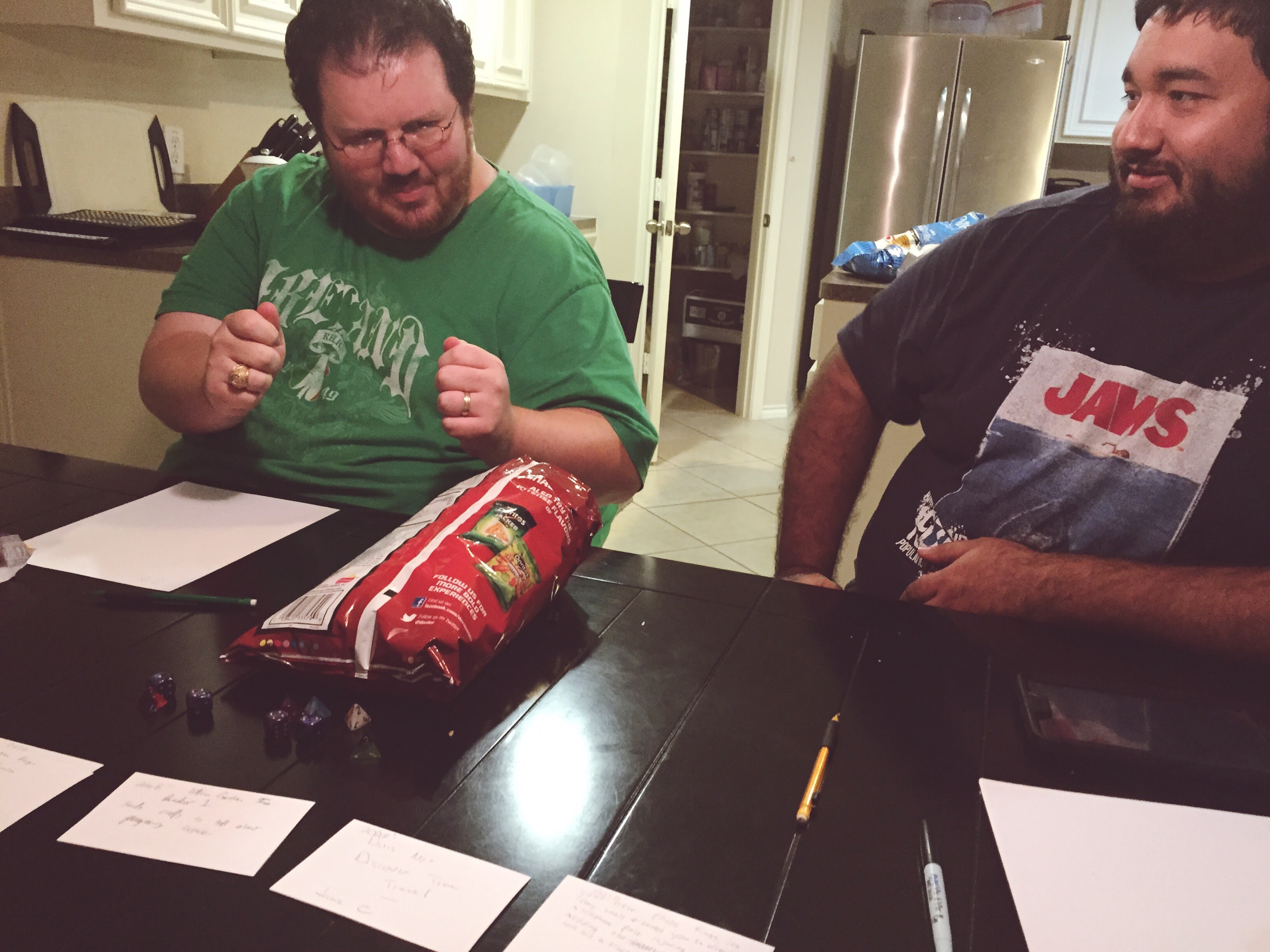
Terrific fun at Saturday Morning Cartoons today.
Terrific fun at Saturday Morning Cartoons today. I’m loving how this series of MH is going. The PCs are each nuanced and interesting; our rogues gallery is filling-up nicely (all praise to the purple lotus!); and there are still a few tantalizing mysteries left to explore in upcoming sessions.
Thanks to everyone who played: Richard Rogers Yoshi Creelman steven watkins and Jørund Kambestad Lie.
I’m living for all these “reviews” of #Threeforged games, many of which involve snap judgments and don’t actually…
I’m living for all these “reviews” of #Threeforged games, many of which involve snap judgments and don’t actually say anything helpful about the game in question. Granted, there are a lot of good first impressions out there, but some of these people are just like “Oh, I read this one sentence I disagree with and then bailed.” Really? Thanks for your insight, homeboy.
As an aside, I’d like to point out we’re actually playing the games we choose to discuss.
Last night we played the #Threeforged games Ultranormal Encounters and Last Year’s Magic.
Last night we played the #Threeforged games Ultranormal Encounters and Last Year’s Magic.
In Ultranormal Encounters, players are a group of people who have been abducted by some entity, and who are now being questioned by government agents (who are also played by the players) about what happened. Each of the abductees has a different interpretation of the events, and gameplay involves a series of cuts between each of them telling their version of events, and either supporting or refuting what the other characters are saying.
The start of the game, which involves selecting a scenario containing certain facts and character types, and then subtly tweaking those facts and characters to give you a unique set-up, is pretty fun. The gameplay is also enjoyable. . . to a point. While it is undeniably fun to cast doubts on each character’s story and then smash-cut away to see if another character backs them up, our game started to feel like a drag after awhile. Part of the problem is the characters begin with wildly different versions of what happened (this is determined in set-up), and so the conflicting stories between players start to really defy belief, and even turn downright comic. I think an easy fix would be to simply have two disputed versions of what ultimately happened to the characters, with each character on one side or the other, and to have those differing versions of events have some similarities so as to avoid gonzo outcomes.
Another reason our game started to drag is the mechanical pacing is off. We eventually threw in the towel and just stopped, but, per the rules of the game, we probably could have kept going for another 2 hours. As mentioned, the smash-cut gameplay, in which you tell an increasingly convoluted (and contradictory) tale, is pretty fun, but it wears out its welcome after about an hour. The rules need to be revised to get you to an earlier, cleaner endgame.
All that said, this game has a ton of potential. I hope the designers go back and fiddle with it, because I really love the concept and would love to see what the game could be with a little more time in the oven.
Last Year’s Magic is a competitive game about a group of wizards in a pub trying to solve problems with magic. The game involves some free roleplay between the wizards, an imminent problem arising, and then the wizards proposing a magical solution to that problem. Gameplay is a simple trick-taking card affair, with each suit representing a certain magical approach to the problem, such as Connections Between People or Imposing Your Will to Alter Reality. Players describe their magical approach as they lay their card facedown in the hopes that others will play a lower card of the same suit, since a player wins the trick if their suit is the dominant one played and they played the highest value of that suit. Of course, you can’t be too obvious about what your suit is, because if all the cards are the same suit, it’s a bust, and the player with the highest card played in that circumstance loses a bunch of points.
The way in which you try to influence the cards played via your narration is a very interesting component, but, all-in-all, the trick-taking card game was the least compelling thing about Last Year’s Magic. We had a lot more fun just playing our zany wizards, thinking-up problems to tackle, and then describing our magical solutions. The card game part of it felt like an afterthought (and, in some cases, really slowed things down). Which is not to say we didn’t have fun. In fact, we had a great time. But I think we had fun despite the core gameplay, not because of it.
I think there is a way to keep the competitive aspect of Last Year’s Magic intact, while also enhancing the RP that is happening at the table. As it stands, the competitive aspect of the game just feels like a thing that has to be dealt with before you can get back to the fun stuff.
Daniel Lewis Russell Benner and Kristen D might also chime-in with their thoughts.
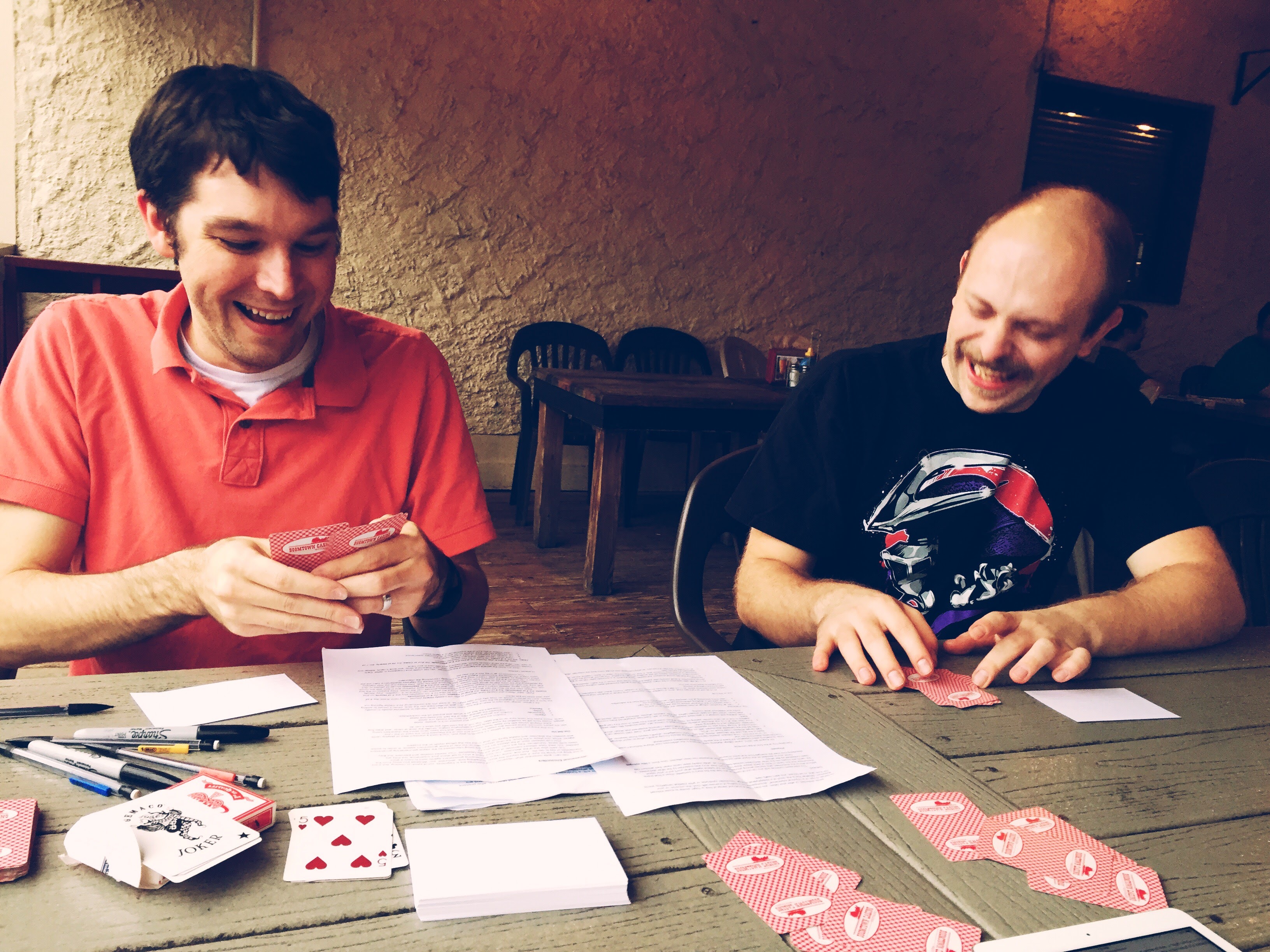
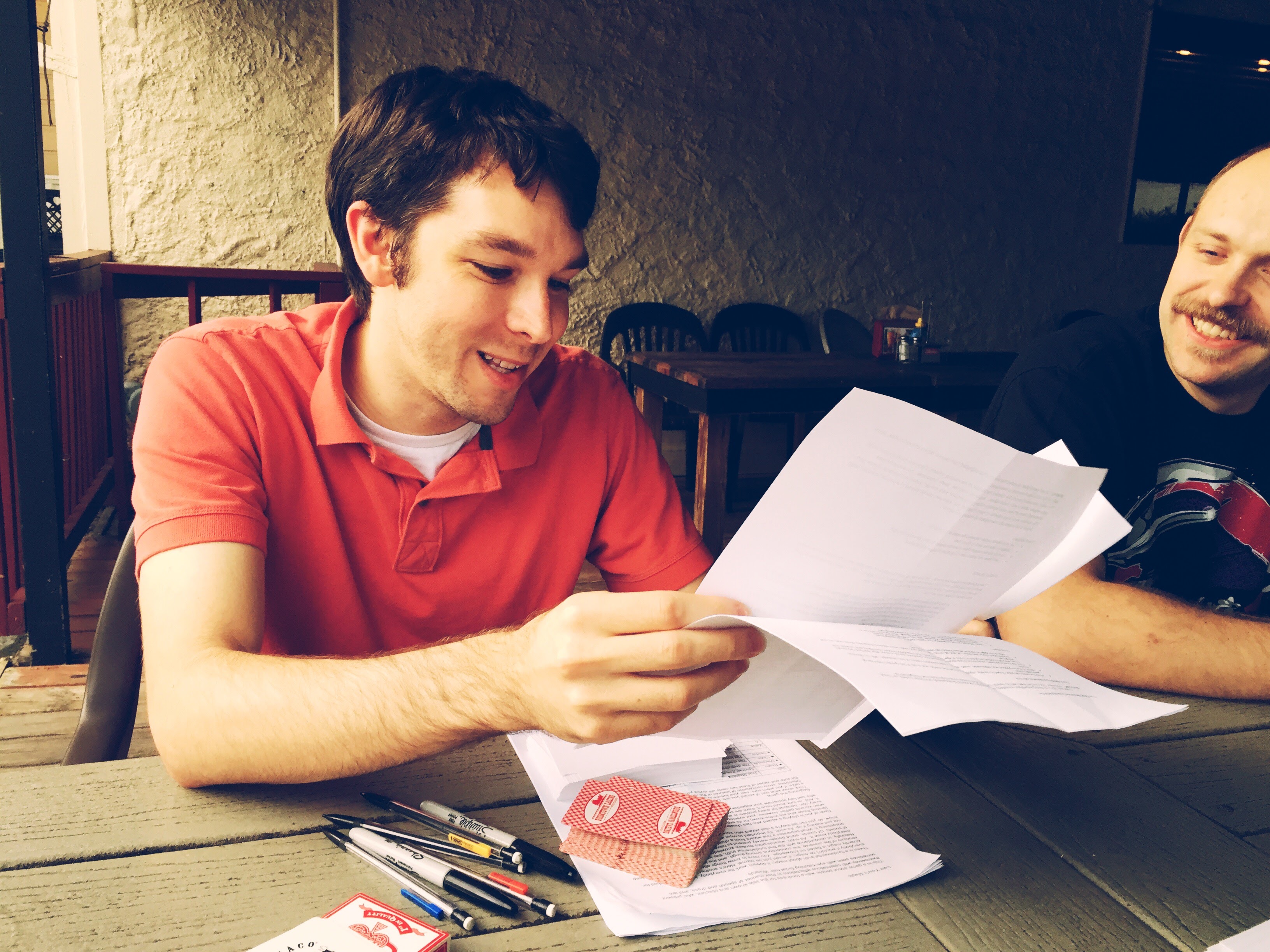
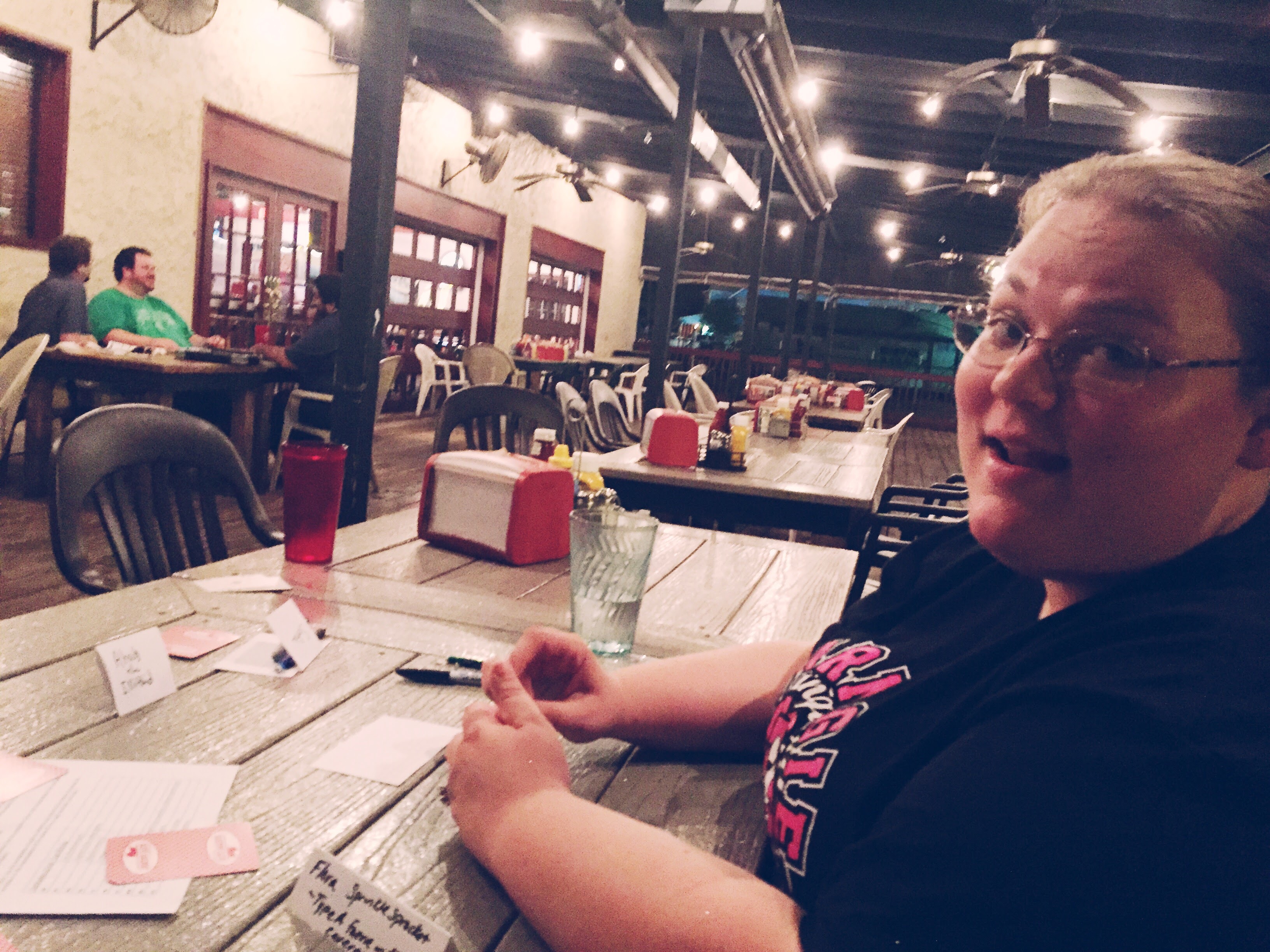
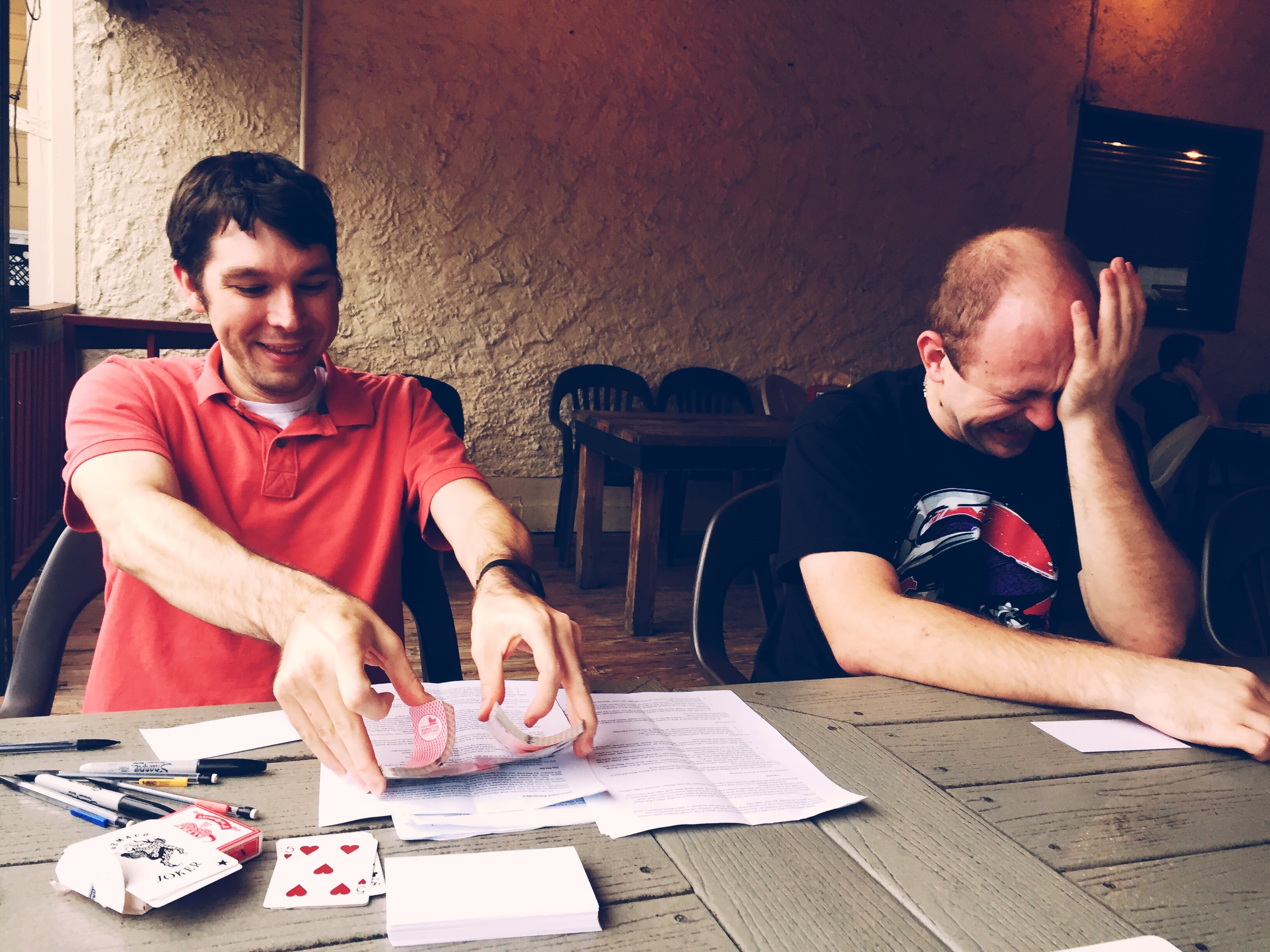
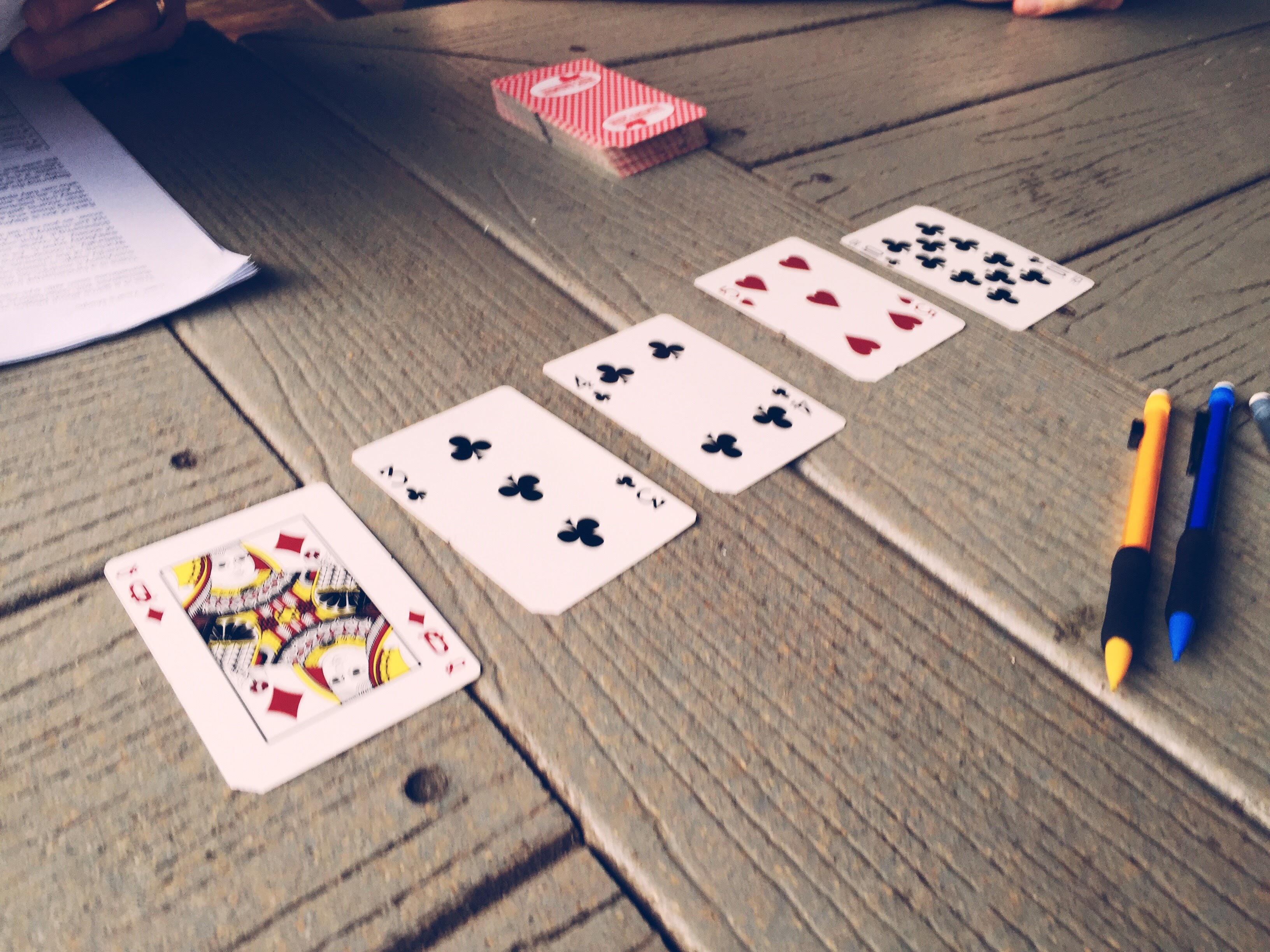
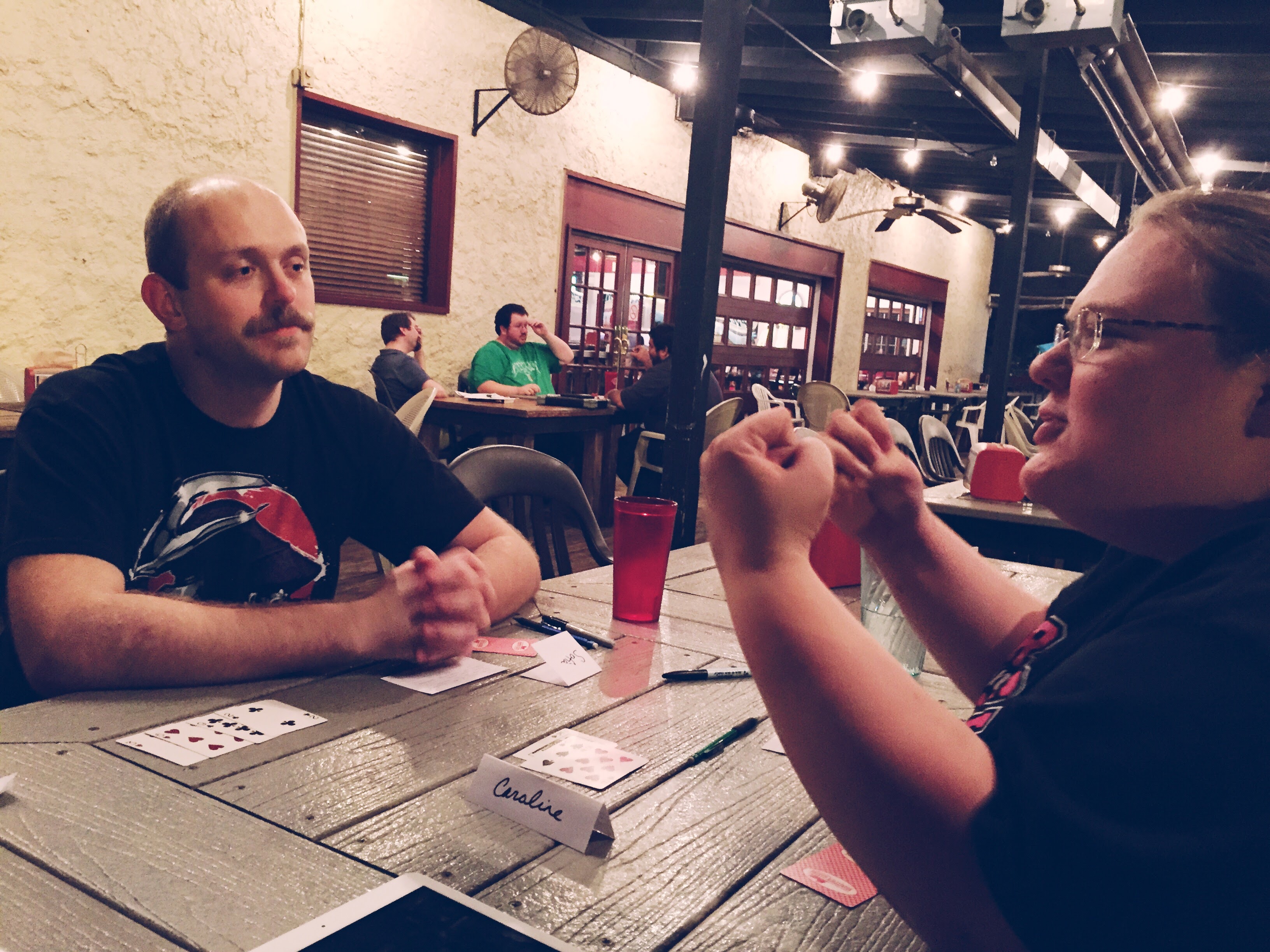
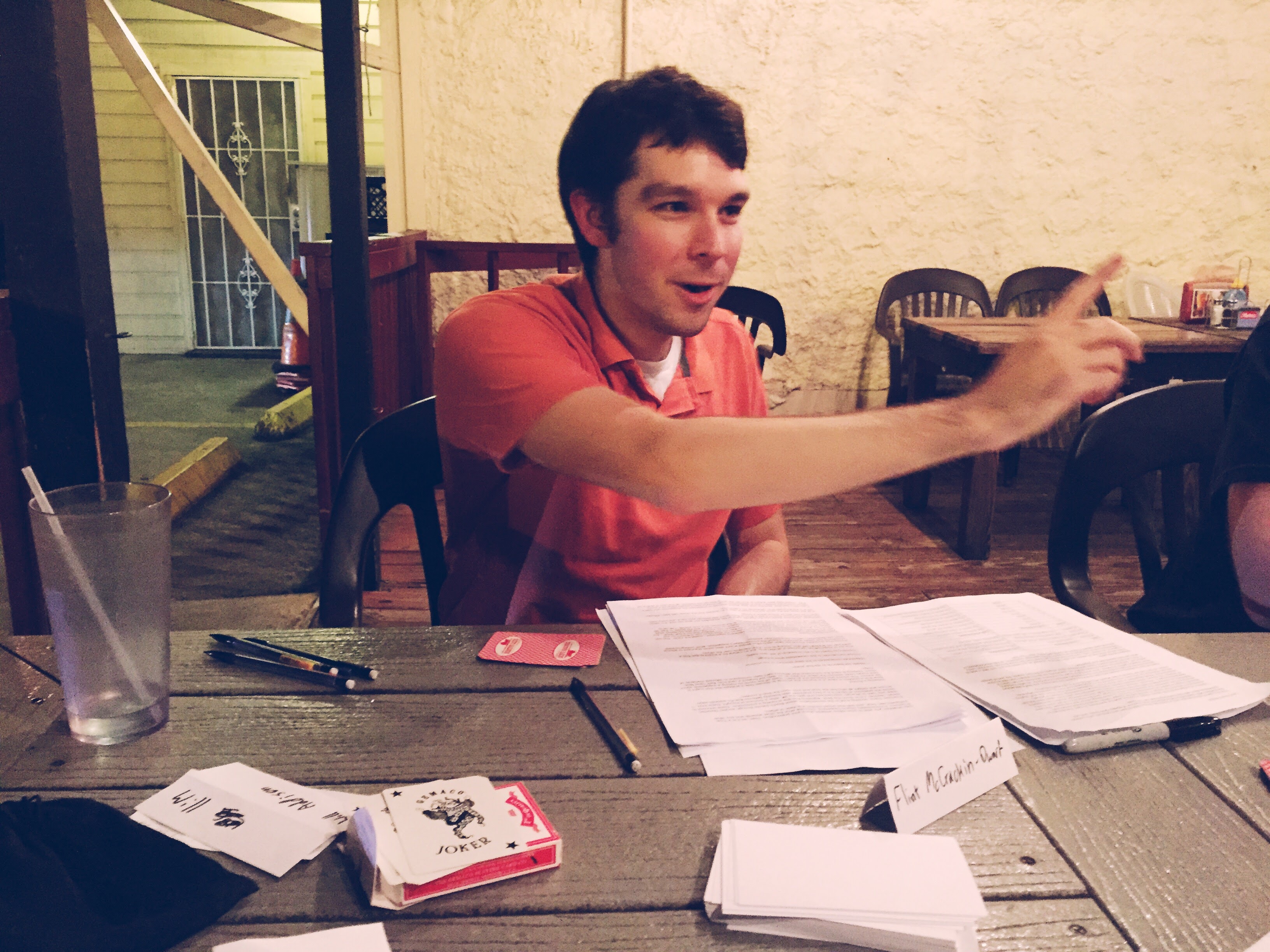
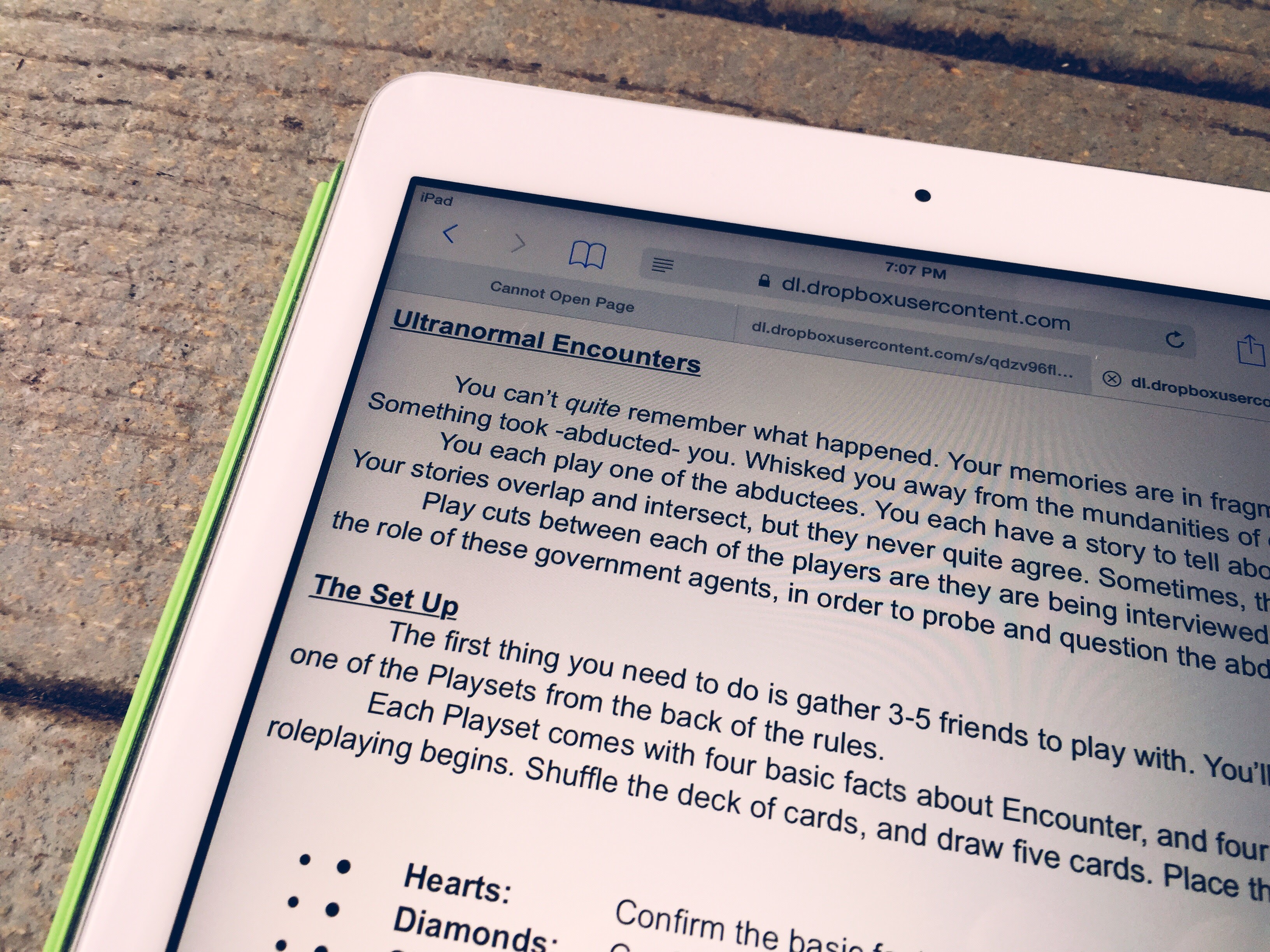
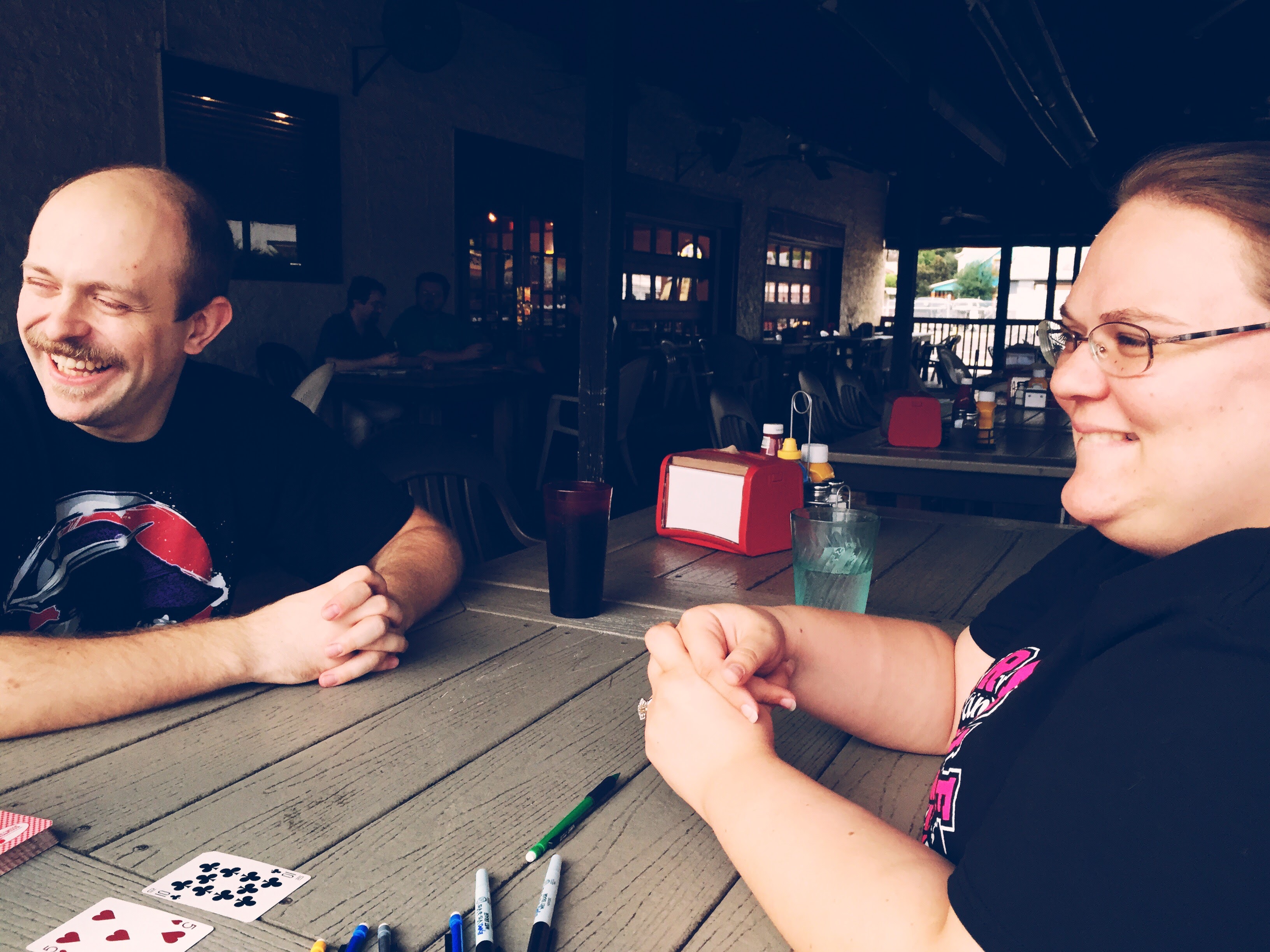
Just a reminder about Gauntlet Hangouts.
Just a reminder about Gauntlet Hangouts. We are currently running three weekly events: Saturday Morning Cartoons, TGI Thursday, and Story Game Sunday. There are presently 11 events on the calendar. Also, Daniel Fowler recently ran a successful Cheat Your Own Adventure play-by-post, and I think we’ll see more stuff like that happening in the future. Our Hangouts round table show, What is a D6?, will be launching very soon as well. Come join us!
I think what’s going to happen with Threeforged is that, basically, six or seven Very Important Game Designers are…
I think what’s going to happen with Threeforged is that, basically, six or seven Very Important Game Designers are going to share their opinion on G+ about which games they like, and then those are the games other people are going to actually read and vote on. We’re not going to see a situation where every game (or even a significant percentage of the games) gets a fair shake.
What’s the best way to get re-involved these days?
What’s the best way to get re-involved these days? Many of the meetup events seem to be regular groups, as opposed to show-up-and-play events. On a related note, are there any regular social gatherings being organized, or is it pure gaming?
My Stage 1 game didn’t make it through to the end for #threeforged :-(.
My Stage 1 game didn’t make it through to the end for #threeforged :-(. I’m surprisingly bummed out about it. Like, “my enthusiasm for the contest is completely drained” bummed out.
All the Treasure They Left Behind
All the Treasure They Left Behind
When it comes to treasure, the players get their hands on most of it, but not all of it. The linked document is a list of everything my players managed to leave behind in the nearly 200 sessions of Dungeon World I ran for them. Some of it was missed because the dungeon became overwhelming, and they had to escape before they were finished plundering it. Other times it was just plain carelessness. For example, many of these items were on the bodies of enemies they forgot to search before moving on to the next section.
https://drive.google.com/file/d/0ByS4_7KbXro_SUhFWFAyVl96MDA/view?usp=sharing